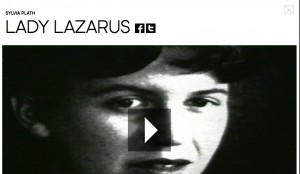Twenty three minutes with Sylvia Plath
If you have been completely cut off from all news and media sources for the last month, you may have missed some surprising news. Or, at least, it surprised me. The Bell Jar turned fifty this year. It was a shock, since I was sure it was from the 60s, which was like twenty five years ago. But not so.
For many female writers who came next, the ghost of Sylvia Plath has always loomed large. Lately, I feel as though she is everywhere I turn. Even this morning, as I was waiting to wave someone away in our drive, I absently switched on the radio on the windowsill and just happened to catch Hayley Atwell reading from Andrew Wilson’s new Plath biography Mad Girl’s Love Song. I hadn’t realised this was the BBC book of the week, although, had I stopped for one minute to consider what it might be, I would have had to guess this, or the Bell Jar itself. (I will search the schedule in a minute, it must surely be there, or on BBC4.) After all, Sylvia and her infectious, feminine, feminist madness is everywhere at the moment.
Which is, in my view, a good thing. For hers is a voice of which I simply never tire. A voice I thought I had quite a good sense of by now. But then yesterday, I had the unexpected pleasure of hearing it for the first time, not in the short, time-capsule clips I am accumstomed to; in which she is dolled out one poem at a time, but rather at meandering length.
 The extraordinary Arts site, the Space, currently has an astonishing short Plath film made my Sandra Lahine in 1991. It’s called Lady Lazarus, and is a deft and confronting montage of Plath imagery, set to the poet’s own voice, either reading her own work, or taken from interviews. It’s not an easy thing to watch but, if you are even remotely interested in Sylvia Plath to begin with, this will have you flying back to the Bell Jar and Ariel.
The extraordinary Arts site, the Space, currently has an astonishing short Plath film made my Sandra Lahine in 1991. It’s called Lady Lazarus, and is a deft and confronting montage of Plath imagery, set to the poet’s own voice, either reading her own work, or taken from interviews. It’s not an easy thing to watch but, if you are even remotely interested in Sylvia Plath to begin with, this will have you flying back to the Bell Jar and Ariel.
There is something both chilling and uplifting about hearing Plath’s voice over a longer spell. It’s from its time, obviously, and so slightly strange. But what really resonates is the vivacity. There is such vivacity at work here, that these echoes of an extraordinary mind only raise more questions about her mortal obsessions.
I read about this film in the Guardian but if you click on the image, it will take you where the film is currently screening on The Space.org.
